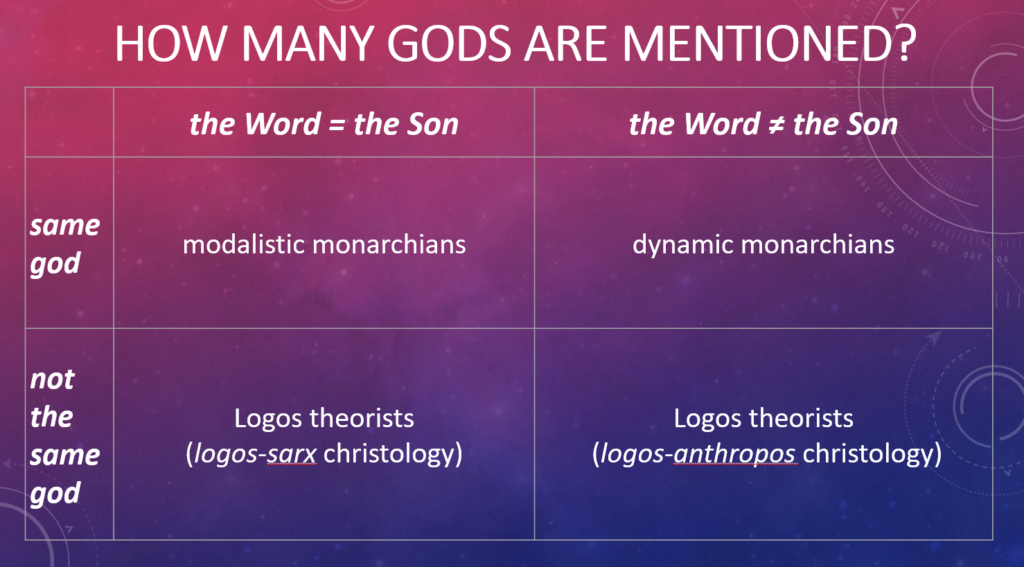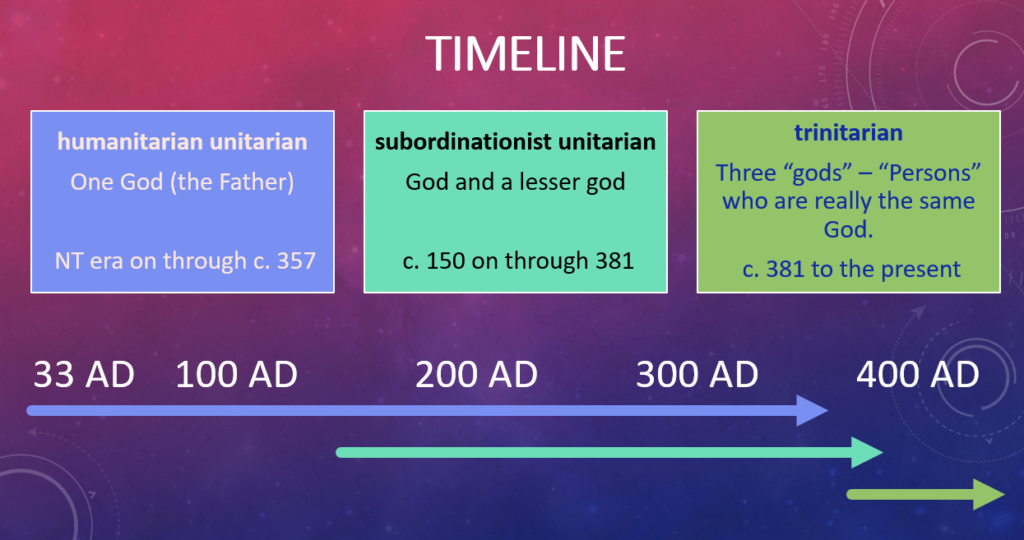Podcast: Play in new window | Download
Subscribe: Spotify | Email | RSS

In this presentation I ask what the author means by saying in John 1:1 that “the Word was God.” Is this the same god as the one mentioned before (“the Word was with God”) or is it a different god? And also, is this “Word” supposed to be the same self as the man Jesus?
It seems that Christian theologians c. 150-250 A.D. disagreed on these questions! As I explain here, there are four options for reading this opening to the fourth gospel – these seem to correspond with the streams of mainstream catholic theologies of the late 100s and early 200s.
I explain why, given the scriptural background to this gospel, only one of those four rightly interpreted this famous Prologue.
Because my PowerPoints will help you to follow this presentation, I recommend the YouTube screencast version of this episode here:
Links for this episode:

- John 1:1-3; Acts 2:22; John 14:10; Genesis 1:1; Genesis 1:3; Genesis 1:26-27; Psalm 33:6; Psalm 148:5; Isaiah 45:12; Isaiah 44:24b; Proverbs 8:23-30.
- “Metaphysics and Logic of the Trinity”
- podcast 270 – Origen’s “one God”
- Clarifying Catholic Christologies
- podcast 164 – On Counting Gods
- Lardner, Nathaniel – The Library of Historical Apologetics
- Lardner on the Trinity
- Video version of this presentation at 21st Century Reformation
- What is the Trinity?
- podcast 70 – The one God and his Son according to John
- podcast 76 – Justin Martyr’s Dialogue with Trypho – Part 3
- podcast 75 – Justin Martyr’s Dialogue with Trypho – Part 2
- podcast 74 – Justin Martyr’s Dialogue with Trypho – Part 1
- podcast 73 – Is Proverbs 8 about Jesus? Part 3
- podcast 72 – Is Proverbs 8 about Jesus? Part 2
- podcast 71 – Is Proverbs 8 about Jesus? Part 1
- podcast 259 – Who is the one Creator? – Part 2
- podcast 258 – Who is the one Creator? – Part 1
- This week’s thinking music is “The Stars Look Different (Ziggy Stardust Mix)” by spinningmerkaba

If I go with the face value of the text then there is a paradox, the Word was with God and the Word was God.
At least I have to believe what the bible says and use it’s own text to interpret itself if I have a high view of the inspiration and preservation and completeness of scripture. The idea is that the bible contains everything that God wishes to have us know in this life. Otherwise did God forget to put something there that he should have done? Oops too late now? Fishing around among the ideas of the time to find some clue as to the true nature of the Logos seems to imply this.
Looking to external sources to shape the interpretation of a biblical text seems at best to portray God as a poor communicator and at worst impugns his wisdom.
Ironically this is the same wisdom that you ascribe to the Logos.
It seems to be an axiom of unitarian thinking to deny the paradox of John 1 v 1, namely that the Word is simultaneously God and not God.
But why should we be surprised that God is radically different in his being than man? In such a way that would be paradoxical to our understanding?
If the Logos is just the the wisdom and power of God acting at will to create how is it possible to assert that Jesus or Moses, as Dale mentioned, are examples of the Logos in action without positing a temporary transfer of divine attributes from God to the agent?
Don’t you end up with a kind of temporary god, a hybrid being, possessing the attributes of both man and God for the temporary duration of whatever miraculous creative action is taking place?
Why is only Jesus associated with the Logos in this way if others also did miracles using the same power and wisdom of God?
When the bible states that God spoke things in to existence do we need to take this literally? “And God said let there be……….”. Was there a sound and speech involved? Or is it just a poetic way of expressing the fact that the will of God is active as the first cause of creation? It could be that God was speaking to the angels who were already created at the time the earth was created. Or even to himself in a way if you are coming to the text from a trinitarian viewpoint.
Maybe you can get round this by claiming that Jesus is only involved in the new creation but the creative activity of the Logos is described as being in the past according to John 1. The idea of identifying the “beginning” with the birth of Jesus is certainly something which just doesn’t seem to fit the text to me.
I also think that the normal kind of trinitarian is not the kind who first builds a kind of theoretical framework and then uses it to catapult himself as it were to believing in the trinity.
It is not my experience. We cannot assume that the “man in the pew” was thinking in the same way as Origen for example.
Another problem is that the woman ( not the attractive one in the picture! ) of Proverbs 6 is not knowable personally by anyone but the Logos is:
“he was in the world, and the world was made by him, and the world knew him not”
The world could have known him if it had chosen to do so and not reject him.
So the two cannot be analogous in my view. The one is real and personal, the other just a literary device.
Thanks for the food for thought.
“deny the paradox” – Yeah, “denial” only applies to obvious facts, and there is nothing at all obvious about the claim that our author there offers an apparent contradiction. On the face of it, this is an uncharitable misreading. Just because God is the subject-matter – this does not license our settling for incoherent interpretations. What if, for instance, someone offered this account of divine providence and grace: God loves absolutely everyone. Also, there are some such that he doesn’t love them. (And we’re not equivocating on the term “love” here.)
Sorry – try again!
That there is no obvious paradox here is proven by the existence of the two theological camps I discuss in this lecture – the logos theorists and the monarchians.
Comments are closed.